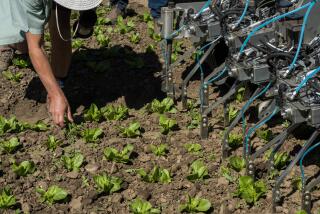The Coming Wave of Bathtub Biotechnology
Barely a dozen years ago, the high priests of computerdom mocked “hackers” as clever misfits and dismissed personal computers as “toys.” The revenge of the nerds, as Bill Gates will cheerfully tell you, has been both sweet and lucrative.
Today, technology and opportunity are rapidly conspiring to create a new generation of hackers. But these folks won’t hack software bits or silicon chips; they’ll hack E. coli, restriction enzymes and double helixes--life itself. Call them “biohackers.” Instead of joy-riding computer networks, they’ll get their kicks out of reprogramming DNA--for better and for worse.
While market forces have yet to spawn the Bill Gates of biotech or the Mitch Kapor of cloning, that’s purely a matter of time. Both technologically and economically, the time is ripe for biohacking to emerge as both a technical and entrepreneurial subculture. Who knows what the DOS of DNA or the Lotus 1-2-3 of microbial manipulation will be? These are now serious questions. Elite molecular biologists may scoff, but biohacking is rapidly becoming a widely diffused skill.
“High school kids are doing things on their own that bright post-docs were doing 10 years ago,” says Vivian Lee, a New York-based biotech industry consultant. “The technology is likely to become even more accessible three years from now, so it should become even more technically trivial to do interesting things. . . . Could we have ‘biotech dweebs’ (biohacking) in their kitchens or their bathtubs? Yeah.”
“It’s exactly the same as putting together your first radio,” insists Rockefeller University molecular biologist Peter Model, who has a high school student helping with his virus research. “In fact, it’s even easier. It’s more like writing software. You can get the klutziest student in the world and they’ll still do all right.
“You could definitely do interesting--and, under special circumstances--especially useful things,” he continues. “You could make your own ‘glow-in-the-dark’ bacteria or get that bacteria to make alpha interferon--no question about it.”
In fact, it’s not brilliant teen-agers but developing countries that are now showing the way in pioneering and provocative discount biotech.
“I was bowled off my feet by what I saw family farmers doing in Vietnam,” says John H. Dodds, a professor of horticulture at Michigan State University and a leader at bringing biotech to the Third World. “We had a family unit set up a plant tissue culture lab that produced over 250,000 potato plants for under $100.”
Dodds says he wouldn’t be surprised to see this sort of biotech-on-the-cheap come to genetic engineering.
Indeed, any enterprising individual could buy reagents, enzymes and bacteria to twiddle a few genes at prices far lower than the original personal computer kits of about 15 years ago. Model argues that budding biohackers could even build a cheapo polymerase chain reaction machine--the machine tool of biotechnology--for under $500. Clearly, price isn’t the problem.
Of course, says Caltech biology professor Elliot Meyrowitz, “You have to ask yourself why (bio-hacking) hasn’t caught on,” even though much of the technology has already been around for a decade.
While Meyrowitz concedes that barriers to biotech are crumbling, he says there still aren’t all that many exciting things people can do at home. But that didn’t stop the early computer hackers.
Nor did legal barriers. The same might be true for the biohackers of tomorrow. There is an Environmental Protection Agency, after all, but how might it track all the bathtub biotech in suburbia?
America wrung its hands over Calgene’s FlavrSavr, a single bioengineered tomato. What happens when biohackers start growing genetically turbocharged vegetables in their own back yard?
Perhaps the issue is cultural. In the 1950s, kids fooled around with chemistry sets. Maybe biochemistry sets in the 1990s hold little appeal. In this media age, perhaps bright teen-agers would rather tinker with clean keyboards than messy enzymes.
On the other hand, biotech is sliding down the same sort of cost curve as computers. You can do more and more manipulation with less and less money. Is it that silly to imagine that people can be as clever reprogramming bacteria as they were in programming video games? Maybe we’ll see the Nintendo of E. coli genetic games.
“I can see it like a cottage industry--like weaving,” says Rockefeller’s Model. “It could attract the same subset of kids who now play with computers.”
And if that subset includes kids like Bill Gates, Mitch Kapor or Steve Jobs, then the Mercks, Genentechs and Calgenes had better be prepared for a very interesting time. So should society. “Do you really want your neighbor’s kid to be cooking up genetically tinkered E. coli bacteria?” asks biotech consultant Lee.
All of a sudden, computer viruses don’t look so bad after all.






